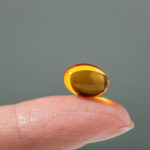By David Blyweiss, M.D., Advanced Natural Wellness
September 21, 2015
- Avoid this public health crisis
- Are you one of the “three out of four” who are deficient?
- Don’t be afraid of the sun
Down here in South Florida, we don’t get much of a winter. But when I lived in Philly, the first seasonal snowfall was always invigorating. Of course, by the time January rolled around, I couldn’t wait for the dark and gloomy weather to end.
Well, whether you live in a sunny state like Florida – or a bleaker winter climate like Philly – you may be running low on a vitamin that’s critical to your long-term health.
I’m talking about vitamin D.
Here in the “land of plenty”, a whopping three out of four adults aren’t getting enough of this nutrient. And it’s becoming a real health crisis. You might even be affected without even knowing it.
Here’s the deal…
If you live north of Atlanta, it’s almost impossible to get enough sunlight between October and March to keep your vitamin D levels up to par. This creates a very real possibility that you’re running short on the sunshine vitamin.
But vitamin D deficiency doesn’t just happen to folks who live in the north. It’s a plague that affects the southern states, too.
If you live in the south, you probably learned from an early age to slather on sunscreen before heading outdoors. This reduces the amount of vitamin D your body is able to produce.
In either case, low sun exposure puts you at great risk of deficiency. And if you think this doesn’t concern you, it should.
Depleted levels of vitamin D raise your risk of several deadly forms of cancer. I’m talking about colon cancer, prostate cancer, breast cancer and non-Hodgkin’s lymphoma, just to name a few.
You might be surprised to hear that low levels of vitamin D even increase your chances of developing skin melanoma. This, of course, is one of the key reasons people avoid the sun.
The World's Quickest Solution for Ending Prostate and Urinary Misery
This has recently been revealed to be one of the only real breakthroughs in prostate health.
The seeds of a strange fruit (sometimes called "Chinese Apples") hold powerful phytonutrients that are a revolution in prostate health.
In fact, UCLA and Veterans Administration research have now proved this to be true.
Not only that, but it may be the worlds quickest solution for ending prostate misery.
Simply stated, these phytonutrients represent a huge step beyond beta sitosterol, saw palmetto, and other phytosterols alone.
Simply click HERE if you want to have fast prostate relief...restful, uninterrupted sleep...no more constant "urges to go"...enhanced virility...and optimal prostate support for life.
But cancer isn’t the only disease that vitamin D can protect you from.
Heart disease, diabetes, Alzheimer’s and depression are also high on the vitamin D hit list. Even if you’re only moderately deficient, your odds of all of these age-related health problems will increase.
It’s like a plague of sun-starvation!
I’ll tell you exactly what I tell my own patients.
Don’t count on “fortified” foods for your vitamin D. Chances are you won’t get nearly enough of it. Instead, get tested and supplement with Vitamin D3 in the cholecalciferol form. This is the most natural form and most easily absorbed by your body. Try to find and take one with vitamin K added.
- If you live in a sunny climate like Florida, Hawaii or the Southwest, it’s wise to take at least 1,000 IU daily, unless you get full body exposure for at least 15 minutes daily.
- For those in gloomier climates like the Pacific Northwest or East Coast, increase the dosage to 2,000 IU each day.
- If you’ve been diagnosed as deficient, you can easily take up to 5,000 IU daily.
- Three months later repeat the test, adding a calcium level to see if the vitamin is doing its primary job of absorbing calcium from your gut…and to see where your levels are after supplementing.
If all else fails, get some light therapy. This alternative therapy has become a popular treatment and it makes sense if you’re out of step with the rising and setting of the sun. You can find many options online at Amazon.com.
And no matter where you live, don’t be afraid of the sun. Again, I recommend getting at least 15 minutes of sun on your back, arms, face and legs – without sunscreen – each day
References
van der Rhee H, et al. Is prevention of cancer by sun exposure more than just the effect of vitamin D? A systematic review of epidemiological studies. Eur J Cancer. 2013 Apr;49(6):1422-36. Epub 2012 Dec 10.
Grant WB. Ecological studies of the UVB-vitamin D-cancer hypothesis. Anticancer Res. 2012 Jan;32(1):223-36.
Littlejohns TJ, et al. Vitamin D and the risk of dementia and Alzheimer disease. Neurology. 2014 Sep 2;83(10):920-8.
Baggerly, CA, et al. Sunlight and Vitamin D: Necessary for Public Health. Journal of the American College of Nutrition. Volume 34, Issue 4, 2015






